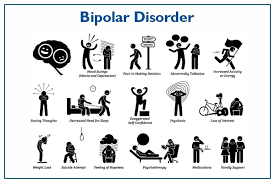The Impact of Depression and Anxiety on Mental Health
Depression and anxiety are two of the most common mental health disorders affecting millions of people worldwide. While they are distinct conditions, they often coexist and share similar symptoms that can have a profound impact on an individual’s well-being.
Depression
Depression is characterized by persistent feelings of sadness, hopelessness, and a loss of interest in activities that were once enjoyed. It can affect how a person thinks, feels, and behaves, leading to emotional and physical manifestations such as fatigue, changes in appetite or sleep patterns, and difficulty concentrating.
Individuals experiencing depression may also struggle with feelings of worthlessness or guilt, which can further exacerbate their condition. It is essential to seek professional help if these symptoms persist to receive proper diagnosis and treatment.
Anxiety
Anxiety is marked by excessive worry or fear about everyday situations. While it is normal to feel anxious in certain circumstances, individuals with an anxiety disorder experience heightened levels of anxiety that can be debilitating and interfere with their daily lives.
Symptoms of anxiety disorders may include restlessness, irritability, muscle tension, and difficulty controlling feelings of worry. In severe cases, panic attacks may occur, causing intense physical sensations such as rapid heartbeat, sweating, trembling, and shortness of breath.
Seeking Help
Both depression and anxiety are treatable conditions. It is crucial for individuals experiencing symptoms of these disorders to reach out for support from mental health professionals. Therapy, medication, lifestyle changes, and self-care practices can all play a role in managing these conditions effectively.
Additionally, building a strong support network of friends and family members who understand your struggles can provide valuable emotional support during difficult times. Remember that seeking help is not a sign of weakness but a proactive step towards improving your mental health.
Conclusion
Understanding depression and anxiety is the first step towards managing these mental health challenges effectively. By recognizing the symptoms early on and seeking appropriate treatment, individuals can regain control over their lives and experience improved overall well-being.
6 Effective Tips for Managing Depression and Anxiety
- Practice deep breathing exercises to help calm your mind and body.
- Engage in regular physical activity as it can improve your mood and reduce feelings of anxiety.
- Maintain a healthy diet with balanced meals to support your overall well-being.
- Seek professional help from a therapist or counselor for support and guidance.
- Connect with supportive friends or family members to talk about your feelings and experiences.
- Practice self-care activities such as meditation, journaling, or hobbies that bring you joy.
Practice deep breathing exercises to help calm your mind and body.
Deep breathing exercises can be a powerful tool in managing symptoms of depression and anxiety. By practicing deep breathing techniques, you can effectively calm your mind and body, reducing feelings of stress and tension. Deep breathing promotes relaxation, slows down racing thoughts, and helps regulate emotions. Incorporating deep breathing exercises into your daily routine can provide a sense of peace and clarity, allowing you to navigate challenging situations with greater ease and resilience.
Engage in regular physical activity as it can improve your mood and reduce feelings of anxiety.
Engaging in regular physical activity is a beneficial tip for managing depression and anxiety. Exercise has been shown to have a positive impact on mood by releasing endorphins, the body’s natural feel-good chemicals. Additionally, physical activity can help reduce feelings of anxiety by promoting relaxation and reducing stress levels. By incorporating regular exercise into your routine, you can experience improved mental well-being and a greater sense of overall health and vitality.
Maintain a healthy diet with balanced meals to support your overall well-being.
Maintaining a healthy diet with balanced meals is a crucial tip for managing depression and anxiety. The food we eat plays a significant role in supporting our overall well-being, including our mental health. Consuming nutrient-rich foods can help regulate mood, energy levels, and cognitive function, while avoiding processed foods and excessive sugar intake can prevent fluctuations in blood sugar levels that may worsen symptoms of depression and anxiety. By prioritizing a balanced diet filled with fruits, vegetables, whole grains, lean proteins, and healthy fats, individuals can provide their bodies and minds with the nourishment needed to cope with the challenges of these mental health conditions.
Seek professional help from a therapist or counselor for support and guidance.
Seeking professional help from a therapist or counselor can provide invaluable support and guidance for managing depression and anxiety. These mental health professionals are trained to offer effective strategies, tools, and therapeutic interventions to help individuals navigate their symptoms and work towards healing. By engaging in therapy sessions, individuals can gain insight into their emotions, develop coping mechanisms, and receive personalized care tailored to their specific needs. With the right support system in place, individuals can embark on a journey towards improved mental well-being and a brighter outlook on life.
Connect with supportive friends or family members to talk about your feelings and experiences.
Connecting with supportive friends or family members to talk about your feelings and experiences can be a valuable way to cope with depression and anxiety. Sharing your thoughts and emotions with trusted individuals can provide comfort, validation, and a sense of understanding. By opening up to loved ones, you may feel less alone in your struggles and gain perspective on your challenges. Their support and empathy can help you feel heard and supported, contributing to a stronger sense of connection and well-being during difficult times.
Practice self-care activities such as meditation, journaling, or hobbies that bring you joy.
Engaging in self-care activities such as meditation, journaling, or pursuing hobbies that bring you joy can be instrumental in managing symptoms of depression and anxiety. Taking time for yourself to focus on mindfulness through meditation, expressing your thoughts and emotions through journaling, or immersing yourself in activities that spark happiness can provide a sense of calm and rejuvenation. These practices not only offer a much-needed break from stressors but also help cultivate a positive mindset and promote emotional well-being. Prioritizing self-care activities as part of your routine can contribute to a healthier mental state and aid in coping with the challenges posed by depression and anxiety.


